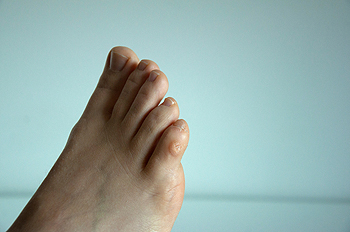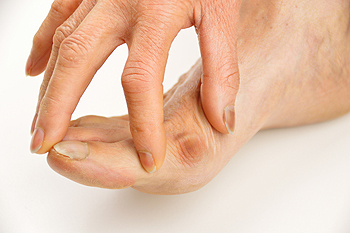
Corns are thickened areas of skin that usually develop on or between the toes as the result of constant pressure or friction. Corns on the toes or feet can make walking difficult and painful, especially when the affected area rubs against the inside of your shoe. A defining feature of a corn is its hardened core, which can press into the deeper layers of skin and cause sharp pain or tenderness that limits mobility. Symptoms may include dry, flaky skin, discomfort when wearing shoes, and raised, rough bumps that are painful to the touch. Poorly fitting footwear is a common cause of corns, especially styles that crowd the toes or create pressure points. A podiatrist can provide treatment to safely remove a corn as well as suggest prevention strategies. If you have foot pain that is caused by a corn, it is suggested that you schedule an appointment with a podiatrist for an exam and appropriate treatment.
Corns can make walking very painful and should be treated immediately. If you have questions regarding your feet and ankles, contact Theresa Brown, DPM of Essie M.B. Smith Foot Clinic. Our doctor will treat your foot and ankle needs.
Corns: What Are They? And How Do You Get Rid of Them?
Corns are thickened areas on the skin that can become painful. They are caused by excessive pressure and friction on the skin. Corns press into the deeper layers of the skin and are usually round in shape.
Ways to Prevent Corns
There are many ways to get rid of painful corns such as:
- Wearing properly fitting shoes that have been measured by a professional
- Wearing shoes that are not sharply pointed or have high heels
- Wearing only shoes that offer support
Treating Corns
Although most corns slowly disappear when the friction or pressure stops, this isn’t always the case. Consult with your podiatrist to determine the best treatment option for your case of corns.
If you have any questions please feel free to contact our office located in Montgomery, AL . We offer the newest diagnostic and treatment technologies for all your foot and ankle needs.

Bunions are often caused by genetics, abnormal foot structure, or arthritis, leading to the gradual misalignment of the big toe. People with a family history of bunions are more likely to develop them, as genetic factors can influence foot shape. Abnormal foot mechanics, such as flat feet or an imbalance in the way you walk, can put excessive pressure on the toe joint, contributing to bunion formation. Arthritis, particularly osteoarthritis, can also cause joint inflammation, leading to the development of bunions. Symptoms of bunions include pain, swelling, and redness at the base of the big toe. As the tip of the toe angles toward the second toe, it can be difficult to wear shoes and walk comfortably. In severe cases, the condition can cause stiffness or even hammertoe. A podiatrist can diagnose the condition and provide treatment options, including custom orthotics, anti-inflammatory medication, or surgery, if needed. If you have a painful bunion, it is suggested that you schedule an appointment with a podiatrist.
If you are suffering from bunion pain, contact Theresa Brown, DPM of Essie M.B. Smith Foot Clinic. Our doctor can provide the care you need to keep you pain-free and on your feet.
What Is a Bunion?
Bunions are painful bony bumps that usually develop on the inside of the foot at the joint of the big toe. As the deformity increases over time, it may become painful to walk and wear shoes. Women are more likely to exacerbate existing bunions since they often wear tight, narrow shoes that shift their toes together. Bunion pain can be relieved by wearing wider shoes with enough room for the toes.
Causes
- Genetics – some people inherit feet that are more prone to bunion development
- Inflammatory Conditions - rheumatoid arthritis and polio may cause bunion development
Symptoms
- Redness and inflammation
- Pain and tenderness
- Callus or corns on the bump
- Restricted motion in the big toe
In order to diagnose your bunion, your podiatrist may ask about your medical history, symptoms, and general health. Your doctor might also order an x-ray to take a closer look at your feet. Nonsurgical treatment options include orthotics, padding, icing, changes in footwear, and medication. If nonsurgical treatments don’t alleviate your bunion pain, surgery may be necessary.
If you have any questions, please feel free to contact our office located in Montgomery, AL . We offer the newest diagnostic and treatment technologies for all your foot care needs.

Workers can help prevent foot injuries in the workplace by wearing protective footwear suited to their job environment. Steel toe shoes provide strong protection against heavy objects and compression hazards, making them ideal for construction and industrial settings. Alloy toe shoes offer similar protection while being lighter in weight, reducing strain on the feet during long shifts. Composite toe shoes are made from non-metal materials, providing protection without conducting heat or electricity, which is beneficial in certain work environments. In addition to toe protection, footwear should fit properly, have slip-resistant soles, have adequate arch support and cushioning to reduce fatigue, and improve comfort. If you develop foot pain while working, it is suggested that you visit a podiatrist who can guide you on what type of shoes to wear during your work day.
While working on the feet, it is important to take the proper care of them. For more information about working on your feet, contact Theresa Brown, DPM from Essie M.B. Smith Foot Clinic. Our doctor will treat your foot and ankle needs.
Working on Your Feet
Standing on your feet for long periods of time can cause stress and pain in your feet. Your whole body may experience change in terms of posture, back pain, bunions, callouses and or plantar warts. There are ways to avoid these conditions with proper foot care, smart choices and correct posture.
Positive Changes
Negative heeled shoe – Choosing this shoe type places the heel slightly lower than the ball of the foot. These are great for overall foot health. Find shoes that fit you correctly.
Go barefoot – Our feet were not designed to be enclosed for all hours of the day. Try to periodically expose your feet to air.
Eliminate Pain
Foot Exercises – Performing simple exercises, incorporating yoga and doing stretches are beneficial. This will allow increased blood flow to the area and muscles of the foot.
Achilles tendon – Stretching the foot out flat on the floor will relax the calf muscles and tendon. These exercises can be performed almost anywhere. Make sure you add these exercises to your daily regimen.
With a little bit of this information and knowing more about foot health, you will notice changes. Foot stretches and proper footwear will help with pain and prevent further issues.
If you have any questions please feel free to contact our office located in Montgomery, AL . We offer the newest diagnostic and treatment technologies for all your foot and ankle needs.




